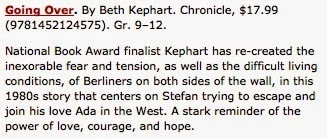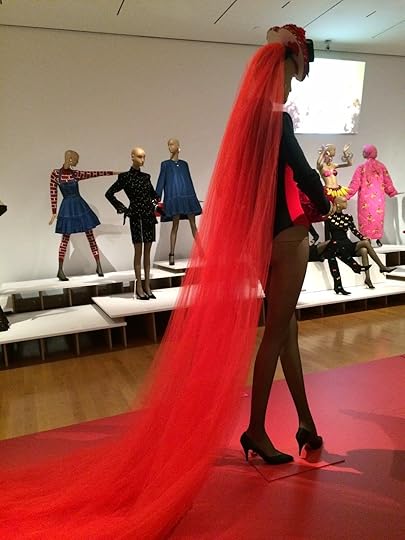Beth Kephart's Blog, page 61
December 19, 2014
first paragraphs: Haruf, Petterson, Harding, Hagy
 In the swell of fever and flu, my mind molten, my thoughts barely latching in, I read (not so random) first paragraphs of favorite books.
In the swell of fever and flu, my mind molten, my thoughts barely latching in, I read (not so random) first paragraphs of favorite books.These for the melodies that do not interfere with the economy of the stories unveiled. For how, in mere lines, we know who we're in with, the stretch of the world, the mood, the names of the places or the insignificance of names.
Here was this man Tom Guthrie in Holt standing at the back window in the kitchen of his house smoking cigarettes and looking out over the back lot where the sun was just coming up. When the sun reached the top of the windmill, for a while he watched what it was doing, that increased reddening of sunrise along the steel blades and the tail vane above the wooden platform. After a time he put out the cigarette and went upstairs and walked past the closed door behind which she lay in bed in the darkened guest room sleeping or not and went down the hall to the glassy room over the kitchen where the two boys were. — Kent Haruf, Plainsong
Early November. It's nine o'clock. The titmice are banging against the window. Sometimes they fly dizzily off after the impact, other times they fall and lie struggling in the new snow until they can take off again. I don't know what they want that I have. I look out the window at the forest. There is a reddish light over the trees by the lake. It is starting to blow. I can see the shape of the wind on the water. — Per Petterson, Out Stealing Horses
George Washington Crosby began to hallucinate eight days before he died. From the rented hospital bed, placed in the middle of his own living room, he saw insects running in and out of imaginary cracks in the ceiling plaster. The panes in the windows, once snugly pointed and glazed, stood loose in their sashes. The next stiff breeze would topple them all and they would flop onto the heads of his family, who sat on the couch and the love seat and the kitchen chairs his wife had brought in to accommodate everyone. The torrent of panes would drive everyone from the room, his grandchildren in from Kansas and Atlanta and Seattle, his sister in from Florida, and he would be marooned on his bed in a moat of shattered glass. Pollen and sparrows, rain and the intrepid squirrels he had spent half of his life keeping out of the bird feeders would breach the house. — Paul Harding, Tinkers
She was a gift, though he did not think of her that way for a long time. He paid twelve hundred dollars for her, money that came straight from his single account at Cabin Valley Bank. She was halter broke, and trailer broke, and she had been wormed for the spring. Someone had taken a rasp to her feet. She had seen her dam, Sally's Quick Ticket, win more than one prize in cutting horse competitions.... — Alyson Hagy, Boleto




Published on December 19, 2014 08:25
the share some love, share some books greeting from Chronicle
Published on December 19, 2014 05:24
December 18, 2014
Going Over: a 2014 Booklist Editors' Choice and, among two committed readers, a "best of"
 Thank you, Booklist Editors, for including Going Over as one of 16 novels for older readers in your 2014 Editor's Choice books.
Thank you, Booklist Editors, for including Going Over as one of 16 novels for older readers in your 2014 Editor's Choice books.And thank you, Serena Agusto-Cox and Sarah Laurence, for being such interesting and committed readers—of many genres, of many books—and of sharing the stories you find with the rest of us. I'm honored to be on your year-end lists, among books that I, too, loved.
Serena Agusto-Cox, for those of you who might not know, is a poet and, beginning in 2015, a reader/writer offering her impressive skills through Poetic Book Tours. She blogs, intelligently and generously, about books here.
Sarah Laurence, meanwhile, is an artist and writer and reviewer, represented by Laura Geringer. I've always been intrigued by her take on books and have always be so very grateful that she has taken time to read and reflect on my own.
<!-- /* Font Definitions */ @font-face {font-family:Cambria; panose-1:2 4 5 3 5 4 6 3 2 4; mso-font-charset:0; mso-generic-font-family:auto; mso-font-pitch:variable; mso-font-signature:3 0 0 0 1 0;} /* Style Definitions */ p.MsoNormal, li.MsoNormal, div.MsoNormal {mso-style-parent:""; margin:0in; margin-bottom:.0001pt; mso-pagination:widow-orphan; font-size:12.0pt; mso-bidi-font-size:10.0pt; font-family:"Times New Roman"; mso-ascii-font-family:Cambria; mso-ascii-theme-font:minor-latin; mso-fareast-font-family:Cambria; mso-fareast-theme-font:minor-latin; mso-hansi-font-family:Cambria; mso-hansi-theme-font:minor-latin; mso-bidi-font-family:"Times New Roman"; mso-bidi-theme-font:minor-bidi;} @page Section1 {size:8.5in 11.0in; margin:1.0in 1.25in 1.0in 1.25in; mso-header-margin:.5in; mso-footer-margin:.5in; mso-paper-source:0;} div.Section1 {page:Section1;} -</style><br /><style> </style><br /><style> </style> <div class="feedflare">
<a href="http://feeds.feedburner.com/~ff/BethK... src="http://feeds.feedburner.com/~ff/BethK..." border="0"></img></a> <a href="http://feeds.feedburner.com/~ff/BethK... src="http://feeds.feedburner.com/~ff/BethK..." border="0"></img></a> <a href="http://feeds.feedburner.com/~ff/BethK... src="http://feeds.feedburner.com/~ff/BethK..." border="0"></img></a> <a href="http://feeds.feedburner.com/~ff/BethK... src="http://feeds.feedburner.com/~ff/BethK..." border="0"></img></a>
</div>
Published on December 18, 2014 08:25
December 17, 2014
Colum McCann, on the readerly reaction that would complete us
 In this week's New Yorker, in a piece called "The Word Shed," Colum McCann writes of his father, a features editor and author, typing away in a shed. McCann, at the time, was a kid. Wanted to play soccer. Didn't pay his father's two-fingered typing much mind.
In this week's New Yorker, in a piece called "The Word Shed," Colum McCann writes of his father, a features editor and author, typing away in a shed. McCann, at the time, was a kid. Wanted to play soccer. Didn't pay his father's two-fingered typing much mind.Until a book his Dad wrote appeared, written for kids, called "Goals for Glory," the story of a boy without much money who dreamed of soccer triumphs. McCann read the story by flashlight, he says. One year later, when the book was published, he took it to school, where his teacher read one chapter per week to McCann and his classmates.
I pick up McCann's telling of this perfect story here:
I will never forget Christopher Howlett, my red-headed desk mate, jumping around like a prayer in an air raid as Mr. Kells reached the final page. Georgie scored the winning goal. The classroom erupted. The kid from my father's shed—that tangle of hair that had somehow sprung up from behind a typewriter ribbon—was carried with us outside the school gates, down Mart Lane, through the swamp, and into the field at the back of Dunnes Stores, where, with a soggy leather ball at our feet, we all became Georgie, at least for a minute or two.Two days ago, I wrote here of why I write, of how it calms me, of how it releases me, for a spell, from the world. I'd like to amend that post to say this as well:
I write for that one reader (there need be only one) who may "jump around like a prayer in an air raid" while reading toward or listening for the story's end.
Do we love Colum McCann? Oh, yes we do. Do we love his dad? That, too.
(Oh how I came to own three copies of Transatlantic, and other McCann love.)




Published on December 17, 2014 06:02
December 16, 2014
Extraordinary words by a reader/writer whose words I value, about GOING OVER
 Yesterday, Lara Starr of Chronicle Books wrote to share the news that GOING OVER was included in the BCCB Holiday Gift Guide, news I read while giving a very old friend a tour of the Penn campus. The entire list is worth reading, for those of you who are still in shopping mode.
Yesterday, Lara Starr of Chronicle Books wrote to share the news that GOING OVER was included in the BCCB Holiday Gift Guide, news I read while giving a very old friend a tour of the Penn campus. The entire list is worth reading, for those of you who are still in shopping mode.(Buy books from real bookstores! Please!)
This morning, Twitter delivers this incredibly gorgeous and smart review of the book that defined, for me, much of my writing and teaching year. These are words only Colleen Mondor—author, publisher, critic, woman deeply invested in history—could write. I share a final paragraph, but every single word she writes, the perspective she yields about this period, and the photo she used to headline her review matter to me. They put a tear on my face this morning.
Going Over is a teen novel of far bigger ideas than most I have come across. The setting is brilliant and the split narrative, between Ada and Stefan, provides readers with a close look at just how different Berlin became after the split. (Which also makes the reunification that much more impressive.) There are so many novels set during WWII, while the Cold War remains stubbornly overlooked. I'm thus delighted with what Kephart has done here and find these characters, in their decidedly European setting, to be different in the best way. It's a thought provoking title with exceedingly likeable characters and a great ending; all of which make Going Over a winner.
So many thanks, Colleen, and BCCB, and all those who believed in Berlin, and in me, this year. You allow me to keep dreaming forward in ways I'll never adequately explain. To keep writing these small books that take these big risks and hope to find readers who will willingly enter these worlds.




Published on December 16, 2014 05:33
remembering why I write in the first place
 There is hardly time, hardly ever time, but yesterday morning, early, I wrote three paragraphs of a novel.
There is hardly time, hardly ever time, but yesterday morning, early, I wrote three paragraphs of a novel.Three paragraphs.
Closed my eyes to the terrible news of the world, tunneled in, aligned myself with characters who have lived with me for well over a year and who suffer from an extreme deficit of attention.
The headache I'd been having lifted. The calm that had eluded me set in. I wasn't running, racing, rushing, pressing, jammed against a deadline (several deadlines), and the words walked in.
Three paragraphs.
Enough to remember that it's possible. Enough to look back on as the rush, again, begins. Enough to remember why I write in the first place—not to be famous (I'm not), not to be rich (what does one do with richness?), not for the sake of power (I'll choose family and friendship over power any day). But to be at peace. To stop and listen. To imagine a better world than the one the news reports. To live there, only briefly. To escape inside of me.




Published on December 16, 2014 04:08
December 15, 2014
The Strange and Beautiful Sorrows of Ava Lavender delivers eye-opening writing (and fits no categories — yay!)
 Ellen Klein, who stands behind Alexandria, VA's fabulous independent children's bookstore, Hooray for Books, (and who introduced me to Debbie Levy, a friendship I'll always cherish), sent a somewhat cryptic note not long ago.
Ellen Klein, who stands behind Alexandria, VA's fabulous independent children's bookstore, Hooray for Books, (and who introduced me to Debbie Levy, a friendship I'll always cherish), sent a somewhat cryptic note not long ago.Ellen had read One Thing Stolen, she said. And therefore I was read The Strange and Beautiful Sorrows of Ava Lavender, a book she has called as "rare and beautiful as Mona Lisa's smile." The author is Leslye Walton. It is a debut. It has turned many heads and now, when I think back on it, I remember dear Kelsey Coons (my cousin's daughter, a beautiful soul, a smart cookie, a holder of a master's degree in publishing, a design talent currently completing a fellowship at Chronicle, and a rising star in publishing) urging me toward the title, too.
I was to read the book, Ellen said, but only if I bought it at an independent. (My preference anyway, though my determination to buy Brown Girl Dreaming and I'll Give You the Sun from an independent has been thwarted by sold-out shelves everywhere I turn. Still, I'm holding on.)
In any case, it's been a hectic time. But I found Ava at the Doylestown Bookshop and last night read the first 50 pages. Ava is clearly a no-categories book, a concept I embrace from head to foot. It is also astonishingly beautifully written, and while I have not finished (I will!), I stop in my enthusiasm to quote you this, below. It doesn't matter what the story is about (not yet, not to me, anyway). I'm just in love with the vivacious prose:
The day Emilienne met Satin Lush she was wearing her cloche hat, newly painted with red poppies. Her hair was curled and peeked lightly out from under the hat to cup the curve of her chin. There was a rip in her stocking. It was May and heavy wet lines of spring rain streamed down the windows of the cafe where Emilienne had just spent her day serving black coffee and sticky buns to dreamless Irishmen. The smell of glazed sugar and folded pride still lingered on her clothes. As she waited for the rain to let up, the bells of Saint Peter's chimed five times and the water fell only harder upon the awning over her head.Aren't you in love, too?
She was thinking of the loveliness of such moments, admiring the rain and the graying sky the way one might admire the painting of an up-and-coming artist, one whose celebrity seems presaged by the swirls of his brush marks. It was while she was in the midst of such thoughts that Satin Lush walked out of the cafe, the clink of his legs disturbing the rhythm of the rain against the awning.




Published on December 15, 2014 06:03
December 14, 2014
winter is its own perfect palette
 It was a weekend of many things—a race through every lit hour, the mind awake at 2 AM, the body running (again) two hours on. Don't forget. Do. Go.
It was a weekend of many things—a race through every lit hour, the mind awake at 2 AM, the body running (again) two hours on. Don't forget. Do. Go. Then, mid-afternoon, today, I was walking back to the car, having taken a very tiny Italian pine tree to my mother's grave. Having reset the wreathe my father had planted there. Having had a quiet conversation.
I had parked, deliberately, at a distance. I had wanted not to hurry through this visit with my mother at Christmas. She has been gone eight years. We talk, still.
It's easy to think of winter as leaching the color from things. Today, returning to the car, less speed in me, more calm, I stopped to see how winter is (in fact) its own quite perfect palette.




Published on December 14, 2014 16:37
December 13, 2014
the One Thing Stolen catalog page, with a nod of thanks to the designers
 The Chronicle catalog is so entirely riveting that one could put a bow on it and tuck it under a tree.
The Chronicle catalog is so entirely riveting that one could put a bow on it and tuck it under a tree.So that it wasn't until several minutes into my perusing that I happened upon this page, for the forthcoming One Thing Stolen, which is, I think (and I have nothing to do with this) so very beautifully done.
And so to those who develop surprise taglines, to those who tuck existing books beside coming books, to those who find the central questions of a story and lodge them right there, for catalog readers to see, thank you: You do exquisite work.




Published on December 13, 2014 04:34
December 11, 2014
he's still mine, and I love him
 Those were the days. Siena. Young motherhood. The palio horses coming.
Those were the days. Siena. Young motherhood. The palio horses coming.That boy is a man. He's nearly a month into his new job. He's Google Adwording and writing web copy and building new marketing strategies and laying out the demographics for products, and frankly:
I can't do any of what he does. Don't know the terms. Probably couldn't pass the tests.
I'm just here to listen, and frankly:
I am head over heels, just as I was all the years ago.




Published on December 11, 2014 14:29





